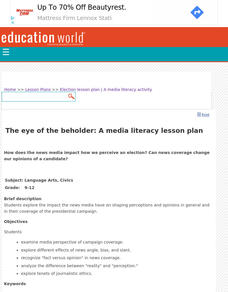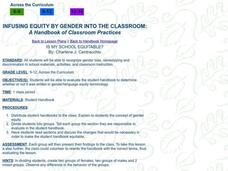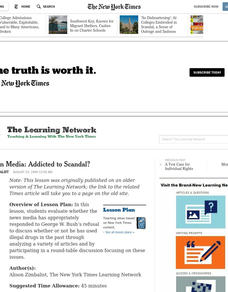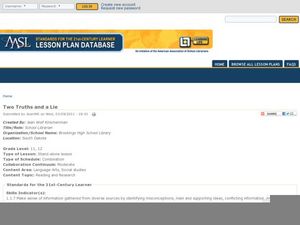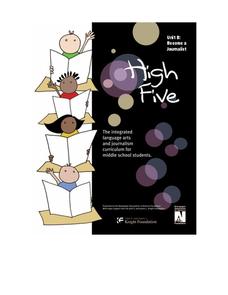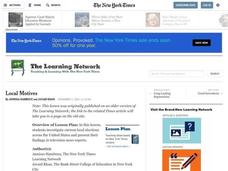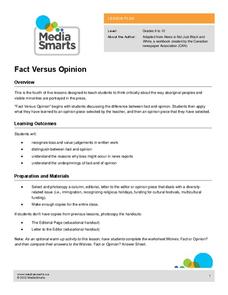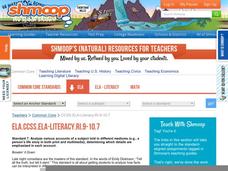Curated OER
Can We Switch Genders of Story Characters?
Young scholars read and review the main elements of a story. In this language arts lesson, students predict what the story read to them would have been like if the genders of the characters had been different. Young scholars write a new...
Curated OER
The Eye of the Beholder: A Media Literacy Activity
Students explore the impact the news media have on shaping perceptions and opinions in general and in their coverage of the presidential campaign.
Curated OER
First Nations in the Media
Students analyze the portrayal of Aboriginal people in the media. In this stereotype identification lesson, students investigate the ways the media represents Aboriginal culture. Students use the Internet to research, and present their...
Curated OER
Modern Minstrelsy: Exploring Racist Stereotypes in Literature and Life
Satires may be designed to expose a bias to ridicule but if misunderstood can they reinforce that bias? Langston Hughes poem, “Minstrel Man” opens a discussion of racist stereotypes, the minstrel tradition, and the musical, “The...
Los Angeles Unified School District
Capitalism and Socialism
Capitalism, socialism, communism ... these may seem like a whole bunch of isms to your scholars. High schoolers won't confuse them after completing an informative resource. Your class masters how to use primary sources to critically...
Curated OER
Antonyms
Explore some higher-level antonyms with your high schoolers. There are 10 main words listed and five antonyms to select from for each. Example vocabulary words include demolish, ceremonious, and biased.
Curated OER
Gender Equity--Cinderella: An Adaptation
Students identify characteristics common to heroines in a fairy tale and list ways images affect males and females. In this gender bias activity, students see an adapted version of "Cinderella" and write a journal response. Students...
Curated OER
Defining Moments: Analyzing Data
Students create an annotated bibliography on writings related to Japanese internment and analyze the writings for possible bias. They view a video on the Korematsu Internment case and use the internet to find print and non-print sources...
Curated OER
A Snapshot in Time
Students state the main ideas of the article. They create questions to clarify the meaning of the article and to help explain the ideas. Students cite words or phrases that reveal a bias the author may have.
Curated OER
Determining Point of View
Students examine web sites to determine point of view and bias in information sources. They determine the usefulness of information based on these biases or limitations.
Curated OER
IS MY SCHOOL EQUITABLE?
Students evaluate student handbooks and determine if it is gender bias.
Curated OER
Language in Classroom Texts
Students research printed material found in a school setting, looking for examples of bias, gender equity or distortion, discrimination and stereotyping.Students work in pairs to develop suggestions for strategies to address bias they...
Curated OER
American Media: Addicted to Scandal?
Students examine media coverage of George W. Bush's refusal to answer questions regarding past illegal drug usage in the 1999 campaign. They consider the role of rumor, scandal, audience and relevance in political media coverage.
Curated OER
Citizens and the Media / Lesson : 3 Compare and Contrast Daily Newspapers for fact, opinion and bias
Students compare and contrast a variety of daily newspapers in order to detect bias. They critically analyze the role the media plays in responsibly reporting government activities.
Curated OER
Two Truths and a Lie: Internet Research Skills
It's tough for high schoolers to assess what is a credible resource and what is not. A helpful resource prompts class members to research a particular topic and record two facts—and create one lie—while documenting the sources. They then...
Online Publications
Become a Journalist
Explore the newspaper as a unique entity with a detailed and extended unit. The unit requires learners to consider the newspaper's role in democracy, think about ethics, practice writing and interviewing, and examine advertising and news...
Curated OER
Local Motives
Investigate current local elections across the United States with this New York Times reading instructional activity. Using informational text, middle and high schoolers research local elections and create their own news reports about...
Curated OER
Propaganda
How does word choice affect the reading of a text? Compare two headlines that were written about the same event. Is one biased? Discuss how word choice often reveals the author's feelings about a topic. Then look at different techniques...
Curated OER
Charles Darwin Meets John Paul II
If you teach AP English language and composition and are looking for a way to address the differences between written and spoken arguments, consider this lesson. Over the course of three days, class members research Charles Darwin or...
Curated OER
How To Do an AP Euro DBQ
Are your AP classes struggling with Document Based Questions? Nip their problems in the bud with this clear and comprehensive presentation, which compares a "dazzling DBQ" to a hamburger, outlining all of the layers therein....
Media Smarts
Fact versus Opinion
Part of a series aimed at breaking down cultural bias from the Canadian Media Awareness Network, this activity identifies where opinions do and don't belong in a newspaper. Pupils review handouts about the purpose of editorial comments...
Shmoop
ELA.CCSS.ELA-Literacy.RI.9-10.7
When your pupils read an account of an event, are they conscious of the fact that this particular account might focus on certain details, while ignoring others? Open their eyes to bias and varying interpretation of facts with the ideas...
iCivics
Drafting Board: Interest Groups
Does the influence of interest groups harm a political system? Your class members will analyze the role of interest groups in American politics, as well as consider the effect of perspective, bias, loyalty, and the First Amendment.
Other popular searches
- Gender Bias
- Bias and Discrimination
- Author's Bias
- Cultural Bias
- Media Bias
- Lesson Plans on Bias
- Bias and Propaganda
- Reporter Bias
- Subject Bias
- Bias Language
- Author Bias
- Gender Bias Statistics



